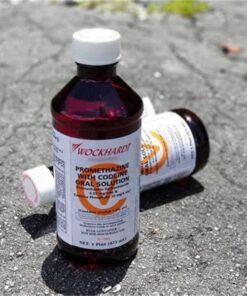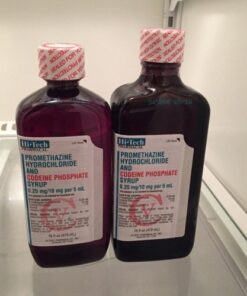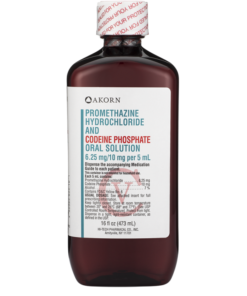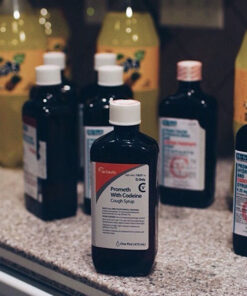Buy Promethazine cough syrup
$22.00 Original price was: $22.00.$20.00Current price is: $20.00.
This buy promethazine cough syrup is used to treat symptoms caused by the common cold, flu, allergies, or other breathing illnesses (e.g., sinusitis, bronchitis). Promethazine is an antihistamine that relieves watery eyes, itchy eyes/nose/throat, runny nose, and sneezing.
Buy Promethazine cough syrup
To begin with, Buy Promethazine cough syrup reduces the permeability of capillaries, swelling of the mucous membranes, itching. Has adrenolytic, moderate peripheral and central cholinolytic action.
promethazine cough syrup Inhibits histamine-N-methyltransferase, blocks central histamine H3 receptors. Oppresses the central nervous system, has a sedative, anxiolytic, antipsychotic and hypnotic effect, lowers body temperature.
promethazine cough syrup reduces the excitability of the vestibular receptors, eliminates dizziness. Has antiemetic effect.
Promethazine cough syrup Description
promethazine cough syrup – causes sedative effect, has antiemetic effect. It has also pronounced to be an adrenoblocking remedy, which moderates peripheral and central anticholinergic action. The effect starts already in 20 minutes after ingestion and lasts up to 6 hours, sometimes up to 12 hours.
This promethazine cough syrup is used to cure some allergic diseases and reactions such as: rash, itching, eczema, drug rash, serum sickness, Quincke’s edema, hay fever, anaphylactic shock, bronchial obstructive syndrome (as part of complex therapy).
Also it is prescribed for the treatment of skin diseases (including eczema, neurodermatitis, diathesis, contact dermatitis and toxicodermia).
Safety information about promethazine cough syrup
When administered orally for adults, the daily dose of the drug is 75-100 mg.
Maximum dosage: during oral administration, single dose – 75 mg, daily – 500 mg; It is used in the composition of lytic mixtures.
Children of 1 – 2 years take 5-10 mg 1-2 times a day; from 2 – 5 years – 5-10 mg 1-3 times a day; From 5 – 10 years – 5-15 mg 1-3 times a day; Older than 10 years and adolescents take 5-20 mg of Promethazine 1-3 times a day. In case of emergency (asthmatic status, false cereal), the dose may be increased to 1-2 mg / kg.
Contraindications:
- simultaneous use of MAO inhibitors,
- coma (including on the background of alcohol intoxication),
- severe disorders of the liver function,
- first trimester of pregnancy,
- lactation (breastfeeding),
- early childhood (2 months),
- hypersensitivity to promethazine or other phenothiazine derivatives.
Side effectsof promethazine cough syrup
– Moderately expressed numbness of the oral mucosa, dry mouth, nausea, constipation, diarrhea, unpleasant sensations; Rarely – jaundice.
– Drowsiness, dizziness, anxiety, lethargy, fatigue, impaired coordination of movements, impaired vision; Rarely – tinnitus, euphoria, nervousness, insomnia, seizures, oculogic crisis, catatonic status, hysteria, psychomotor agitation, extrapyramidal disorders, headache, nystagmus.
– Tachycardia, bradycardia, palpitation, fainting, arterial hypotension (with iv introduction), arrhythmias.
– Contact dermatitis, photosensitivity, urticaria.
– Leukopenia, agranulocytosis, aplastic anemia, thrombocytopenic purpura.
– Exanthema, urticaria, angioedema, anaphylactic reactions.
– Irregular breathing, urinary retention.
Codeine is an opioid cough suppressant (antitussive) that affects a certain part of the brain, reducing the urge to cough.
Opioid cough suppressants should not be used in children younger than 18 years. Children are at higher risk for serious (even fatal) side effects, especially breathing problems. Talk with the doctor about the risks and benefits of this medication.
Cough-and-cold products do not cure colds. Cough due to a common cold often does not need to be treated with medicine. Ask your doctor or pharmacist about other ways to relieve cough and cold symptoms, such as drinking enough fluids, using a humidifier, or saline nose drops/spray.
Can you get promethazine cough syrup over the counter in the US?
How to use promethazine cough syrup
Read the Medication Guide provided by your pharmacist before you start taking codeine/promethazine and each time you get a refill. If you have any questions, ask your doctor or pharmacist.
Take this medication by mouth with or without food, usually every 4 to 6 hours as needed with a full glass of water (8 ounces or 240 milliliters) or as directed by your doctor. This medication can be taken with food if stomach upset occurs. Drink plenty of fluids when you use this medication unless otherwise directed by your doctor.
Carefully measure the dose using a special measuring device/spoon. Do not use a household spoon because you may not get the correct dose.
Do not increase your dose or use this product more often or for longer than prescribed. Your condition will not improve any faster, and your risk of side effects will increase.
If you suddenly stop using this medication, you may have withdrawal symptoms (such as restlessness, watering eyes, runny nose, nausea, sweating, muscle aches). To help prevent withdrawal, your doctor may lower your dose slowly. Withdrawal is more likely if you have used this medication for a long time (more than a few weeks) or in high doses. Tell your doctor or pharmacist right away if you have withdrawal.
Though it helps many people, this medication has a risk for abuse and may sometimes cause addiction. This risk may be higher if you have a substance use disorder (such as overuse of or addiction to drugs/alcohol). Take this medication exactly as prescribed to lower the risk of addiction. Ask your doctor or pharmacist for more details.
When used for an extended time, this medication may not work as well and may require different dosing. Talk with your doctor if this medication stops working well.
Tell your doctor if your cough does not get better in 5 days. Also, tell your doctor if your condition gets worse, or if you have a fever, rash, or persistent headache. These may be symptoms of a serious medical problem and should be checked by a doctor.
Side effects of promethazine cough syrup
See also Warning section.
Drowsiness, dizziness, headache, lightheadedness, blurred vision, upset stomach, nausea, constipation, or dry mouth may occur. If any of these effects persist or worsen, tell your doctor or pharmacist promptly.
This medication can dry up and thicken mucus in your lungs, making it more difficult to breathe and clear your lungs. To help prevent this effect, drink plenty of fluids unless otherwise directed by your doctor.
Remember that your doctor has prescribed this medication because he or she has judged that the benefit to you is greater than the risk of side effects. Many people using this medication do not have serious side effects.
Tell your doctor right away if you have any serious side effects, including: interrupted breathing during sleep (sleep apnea), involuntary behaviors/movements (e.g., fixed upward stare, neck twisting, tongue movements), mental/mood changes (e.g., hallucinations, confusion), ringing in the ears, shaking (tremors), trouble urinating, weakness.
Get medical help right away if you have any very serious side effects, including: easy bruising/bleeding, slow heartbeat, persistent nausea/vomiting, severe abdominal pain, yellowing eyes/skin, seizure.
Codeine is changed into a strong opioid drug (morphine) in your body. In some people, this change happens faster and more completely than usual, which increases the risk of very serious side effects. Get medical help right away if you notice any of the following: slow/shallow breathing, severe drowsiness/difficulty waking up, confusion.
This medication may rarely cause a very serious condition called neuroleptic malignant syndrome (NMS). Get medical help right away if you have any of the following symptoms: fever, muscle stiffness/pain/tenderness/weakness, severe tiredness, severe confusion, sweating, fast/irregular heartbeat, dark urine, signs of kidney problems (such as change in the amount of urine).
A very serious allergic reaction to this drug is rare. However, get medical help right away if you notice any symptoms of a serious allergic reaction, including: rash, itching/swelling (especially of the face/tongue/throat), severe dizziness, trouble breathing.
This is not a complete list of possible side effects. If you notice other side effects not listed above, contact your doctor or pharmacist.
In the US – Call your doctor for medical advice about side effects. You may report side effects to FDA at 1-800-FDA-1088 or at www.fda.gov/medwatch.
In Canada – Call your doctor for medical advice about side effects. You may report side effects to Health Canada at 1-866-234-2345.
Warnings & Precautions | where can i buy promethazine cough syrup order online
Before taking this medication, tell your doctor or pharmacist if you are allergic to any of its ingredients; or to opioid pain relievers (e.g., morphine); or if you have any other allergies. This product may contain inactive ingredients, which can cause allergic reactions or other problems. Talk to your pharmacist for more details.
Before using this medication, tell your doctor or pharmacist your medical history, especially of: abdominal problems (e.g., chronic constipation, ileus, pancreatitis), gallbladder disease, adrenal gland problem (e.g., Addison’s disease), blood/immune system problems (e.g., bone marrow depression), brain disorders (e.g., seizures, head injury, tumor, increased intracranial pressure), breathing problems (e.g., asthma, emphysema, sleep apnea), diabetes, glaucoma, heart problems (e.g., angina, irregular heartbeat), high blood pressure, kidney disease, liver disease, mental/mood problems (e.g., depression, psychosis), obesity, a certain spinal problem (kyphoscoliosis), stomach/intestinal problems (e.g., ulcers, blockage), thyroid disease, trouble urinating (e.g., due to enlarged prostate or urethral stricture), personal or family history of a substance use disorder (such as overuse of or addiction to drugs/alcohol).
This drug may make you dizzy or drowsy. Alcohol or marijuana (cannabis) can make you more dizzy or drowsy. Do not drive, use machinery, or do anything that needs alertness until you can do it safely. Avoid alcoholic beverages. Talk to your doctor if you are using marijuana (cannabis).
To reduce dizziness and lightheadedness, get up slowly when rising from a sitting or lying position.
This medication may make you more sensitive to the sun. Limit your time in the sun. Avoid tanning booths and sunlamps. Use sunscreen and wear protective clothing when outdoors. Tell your doctor right away if you get sunburned or have skin blisters/redness.
This medication may contain sugar and/or alcohol. Caution is advised if you have diabetes, alcohol dependence, or liver disease. Ask your doctor or pharmacist about using this product safely.
Older adults may be more sensitive to the side effects of this drug, especially confusion, dizziness, drowsiness, constipation, trouble urinating, and slow/shallow breathing. Confusion, dizziness, and drowsiness can increase the risk of falling.
Tell your doctor if you are pregnant or think you may be pregnant. During pregnancy, this product is not recommended. It may harm an unborn baby. Talk to your doctor about the risks and benefits of this medication. See also Warning section.
This product passes into breast milk and may have undesirable effects on a nursing infant (such as unusual sleepiness, difficulty feeding, trouble breathing, or unusual limpness). Breast-feeding while using this product is not recommended. Consult your doctor before breast-feeding.
Storage of promethazine cough syrup
Store at room temperature away from light and moisture. Do not store in the bathroom. Do not freeze. Keep all medications away from children and pets.
Do not flush medications down the toilet or pour them into a drain unless instructed to do so. Properly discard this product when it is expired or no longer needed. Consult your pharmacist or local waste disposal company.
Drug interactions
See also Warning section.
Drug interactions may change how your medications work or increase your risk for serious side effects. This document does not contain all possible drug interactions. Keep a list of all the products you use (including prescription/nonprescription drugs and herbal products) and share it with your doctor and pharmacist. Do not start, stop, or change the dosage of any medicines without your doctor’s approval.
Some products that may interact with this drug include: antihistamines applied to the skin (such as diphenhydramine cream, ointment, spray), cimetidine, metoclopramide, naltrexone.
The risk of serious side effects (such as slow/shallow breathing, severe drowsiness/dizziness) may be increased if this medication is taken with other products that may also cause drowsiness or breathing problems. Tell your doctor or pharmacist if you are taking other products such as other opioid pain or cough relievers (such as morphine, hydrocodone), alcohol, marijuana (cannabis), drugs for sleep or anxiety (such as alprazolam, lorazepam, zolpidem), muscle relaxants (such as carisoprodol, cyclobenzaprine), or other antihistamines (such as cetirizine, diphenhydramine).
Check the labels on all your medicines (such as allergy or cough-and-cold products) because they may contain ingredients that cause drowsiness. Ask your pharmacist about using those products safely.
Other medications can affect the removal of codeine/promethazine from your body, which may affect how codeine/promethazine works. Examples include azole antifungals (such as ketoconazole), bupropion, fluoxetine, macrolide antibiotics (such as erythromycin), HIV medications (such as ritonavir), paroxetine, quinidine, rifamycins (such as rifabutin, rifampin), certain drugs used to treat seizures (such as carbamazepine, phenytoin), among others.
This medication may interfere with certain laboratory tests (e.g., some pregnancy tests, blood sugar tests, amylase/lipase levels), possibly causing false test results. Make sure laboratory personnel and all your doctors know you use this drug. Order promethazine cough syrup,
Overdose | where can you buy promethazine cough syrup with bitcoin
Buy promethazine cough syrup with bitcoin. If someone has overdosed and has serious symptoms such as passing out or trouble breathing, call 911. Otherwise, call a poison control center right away. US residents can call their local poison control center at 1-800-222-1222. Canada residents can call a provincial poison control center. Symptoms of overdose may include: confusion, cold/clammy skin, fast/slow/irregular heartbeat, slow/shallow breathing, seizures, fainting, coma.
More
If you are prescribed this medication on a regular schedule and miss a dose, take it as soon as you remember. If it is near the time of the next dose, skip the missed dose. Take your next dose at the regular time. Do not double the dose to catch up.
Do not share this medication with others. Sharing it is against the law.
Do not take this medication for several days before allergy testing because test results can be affected.
Be the first to review “Buy Promethazine cough syrup” Cancel reply
Related products
Cough Syrup
Cough Syrup
Cough Syrup
Cough Syrup
Cough Syrup
Cough Syrup
Cough Syrup











Reviews
There are no reviews yet.